At a closed-door session for youth leaders and pastors at Cornerstone Community Church on October 25, FOPx released their FOPx Research 2023 – a 110-page study offering an “inter-Church and inter-denominational look at the needs of our Youth Ministries, Pastors and Leaders in Singapore”.
The study’s eight key Insights and accompanying suggested solutions (which we will cover in the next article!) to meaningfully support those in youth ministries – especially smaller churches – culminated from research processes like ideations, interviews and surveys with senior pastors, youth pastors and youth leaders. Read the full report for details on the methodology.

Presenting the findings were some of the youth pastors and leaders who had worked on the study:
- Ang Hern Shung (Trinity Methodist Church)
- Joy Lee (Church of Singapore Balestier)
- Samuel Choo (Christ Methodist Church)
- Jeanette Low (RiverLife Church)
- Edwin Fung (New Life Community Church)
- Claire Chua (New Life Community Church)
- Matthew Long (Cornerstone Community Church)
- Joanne Chow (Pasir Panjang Hill Brethren Church)
- Isaac Ong (Cornerstone Community Church)
Do note, where possible, we’ve combined insights from the presentations in the closed-door session as well as the public session since neither covered every Insight. With that, let’s jump into the first Insight!
Insight #1: “Relevance of God in a Complex World”
Samuel Choo (Christ Methodist Church) presented this first Insight, which is about the challenge youth leaders and youth pastors face in preaching and teaching relevantly in a busy, complex context filled with fast youngsters, polarised worldviews and an increasingly secularised society.
“The busy leading the fast” was how Samuel summed up the situation. Youth leaders, youth pastors and senior leadership are so busy that catching up with all that’s happening around is difficult. Meanwhile, youths are fast in collecting and processing information, fast in having and sharing an opinion and fast in their emotions changing.
He added that the responses show that youth leaders and pastors feel ill-equipped to engage younger believers on trending and contentious topics as well as worldly influences. These leaders’ jobs are also made more difficult in today’s day and age where polarised worldviews and distractions are the norm.
Indeed, the survey results showed that the top two choices for greatest challenges faced by youth (that youth pastors and youth leaders are ill-equipped to deal with) were either “worldly distractions and negative influences” or “more secularised society and rejection of spirituality.”
FOPx believes that youth lack an avenue in church to work through these complex topics and issues, and that discipleship at multiple levels is required – from senior leadership to the average churchgoer – so that the church is aligned rightly on its stance towards the issues of the day.
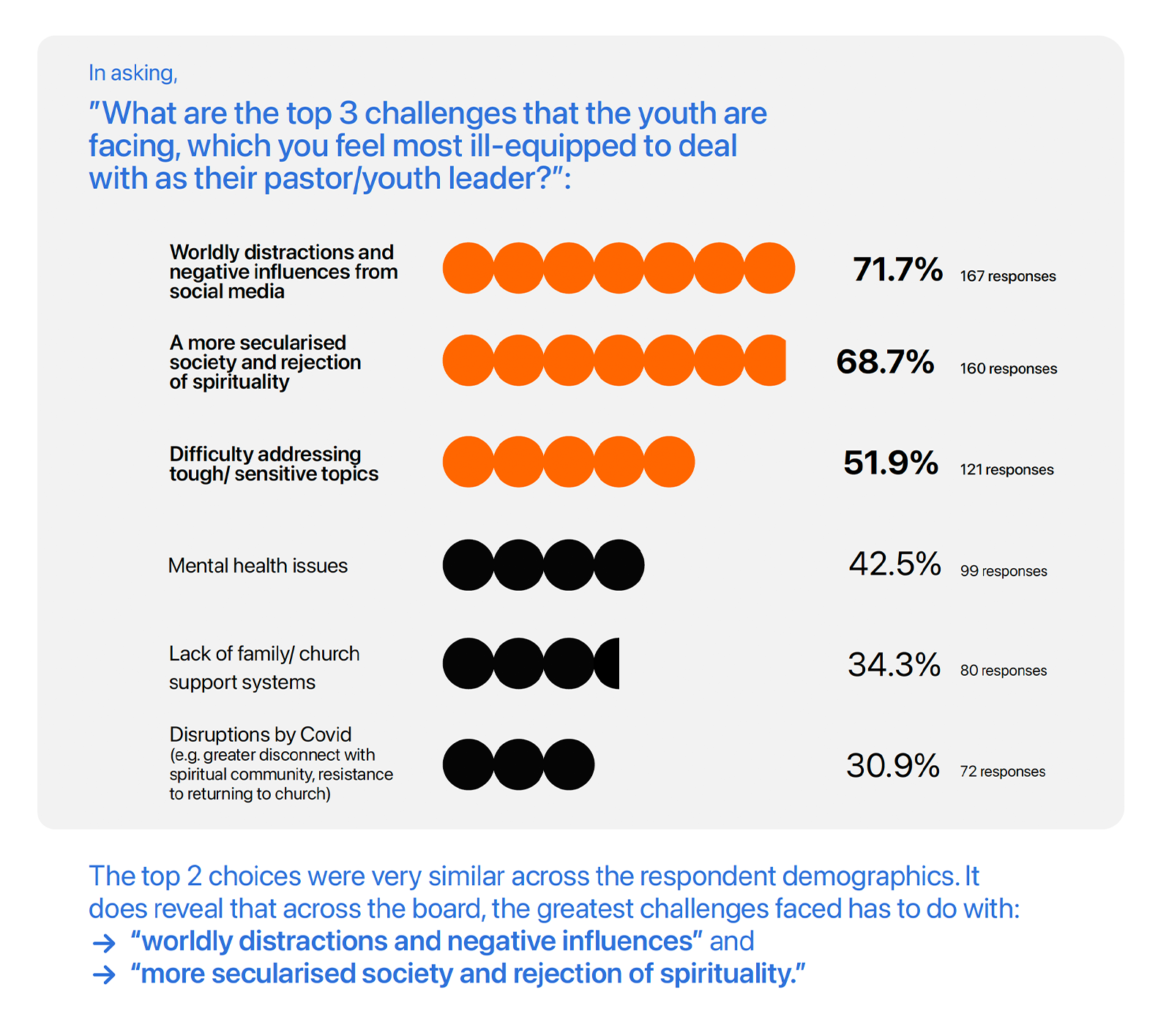
As someone who has led youths and leads young adults, this finding resonated with my own experience in ministry. Everyone serving is busy, and when things get hectic as they often do, the easy thing to do would be to assume that “they should know”. But I’ve found that younger believers often don’t know better or have an established biblical worldview.
Failures in discipleship – both my own and other leaders’ – is how we encounter unwelcome surprises like that younger believer who didn’t think the resurrection was all that important compared to other aspects of the faith, or the cell member who entered an unequally yoked relationship thinking that it’s not a big deal.
Our job as leaders is to make Christ known to our world in ways that are relevant and meaningful. And the truth is that if we don’t disciple our youths – the world will.
Pointing to a chart of a church’s structure – Senior Pastor, Youth Pastor, Youth Leader, Youth – Samuel closed his segment with a sad and sobering reflection: “Youth leaders are ‘in-between’. They are looking for guidance and also having to provide guidance when it comes to relevant and complex issues.”
And that’s as good a segue as any to bring us to the second Insight…
Insight #2: “Support System for Youth Leaders”
Claire Chua (New Life Community Church) then spoke on creating a support system for youth leaders through intentional and effective discipleship.
The survey revealed that youth pastors and leaders struggle to manage their boundaries. “Between juggling church commitments and their personal life, navigating adulthood and maintaining their own spiritual growth, these leaders often end up functioning beyond their capacity,” she said.
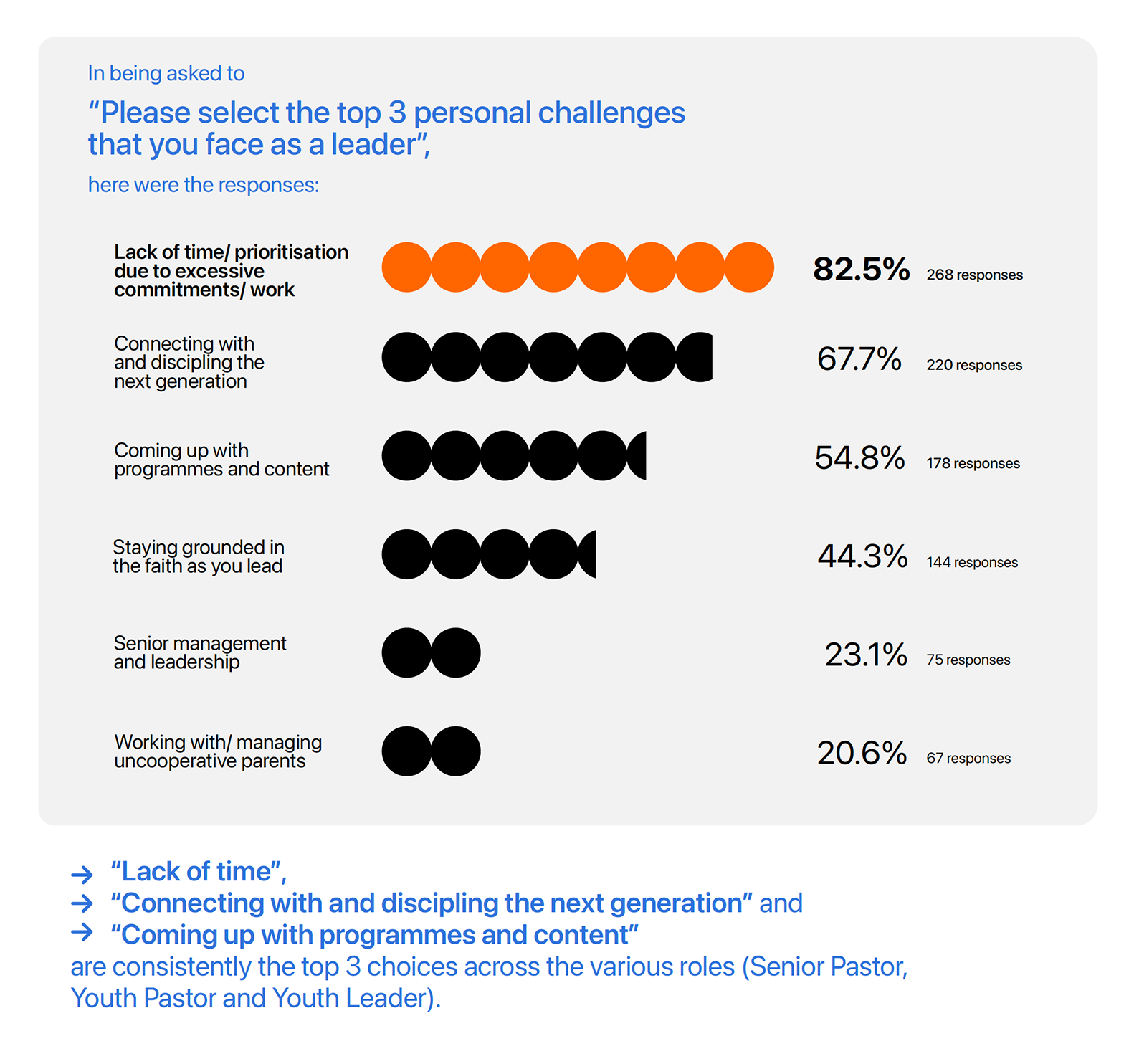
Indeed, the survey showed that when it comes to a leader’s top three personal challenges, “Lack of time” (82.5%) was the top choice among the leaders polled. Additionally, a whopping 90% of church leaders polled find it challenging to manage their commitments at least occasionally – with more than half ranking the frequency of experiencing time-management struggles as a 7 and above out of 10.
These numbers are the basis for the Key Observation in the study, which reads: “At a personal level, the top challenge for Youth Leaders and Pastors is the lack of time, and difficulty in prioritising various work and life commitments.
“Youth Pastors were especially at risk… 7 out of 10 of them have expressed difficulty in managing their church commitments with other life commitments (e.g family, personal life, etc.), as the burden of responsibility and the sense of guiltiness of not doing enough often pushes them beyond their capacity.”
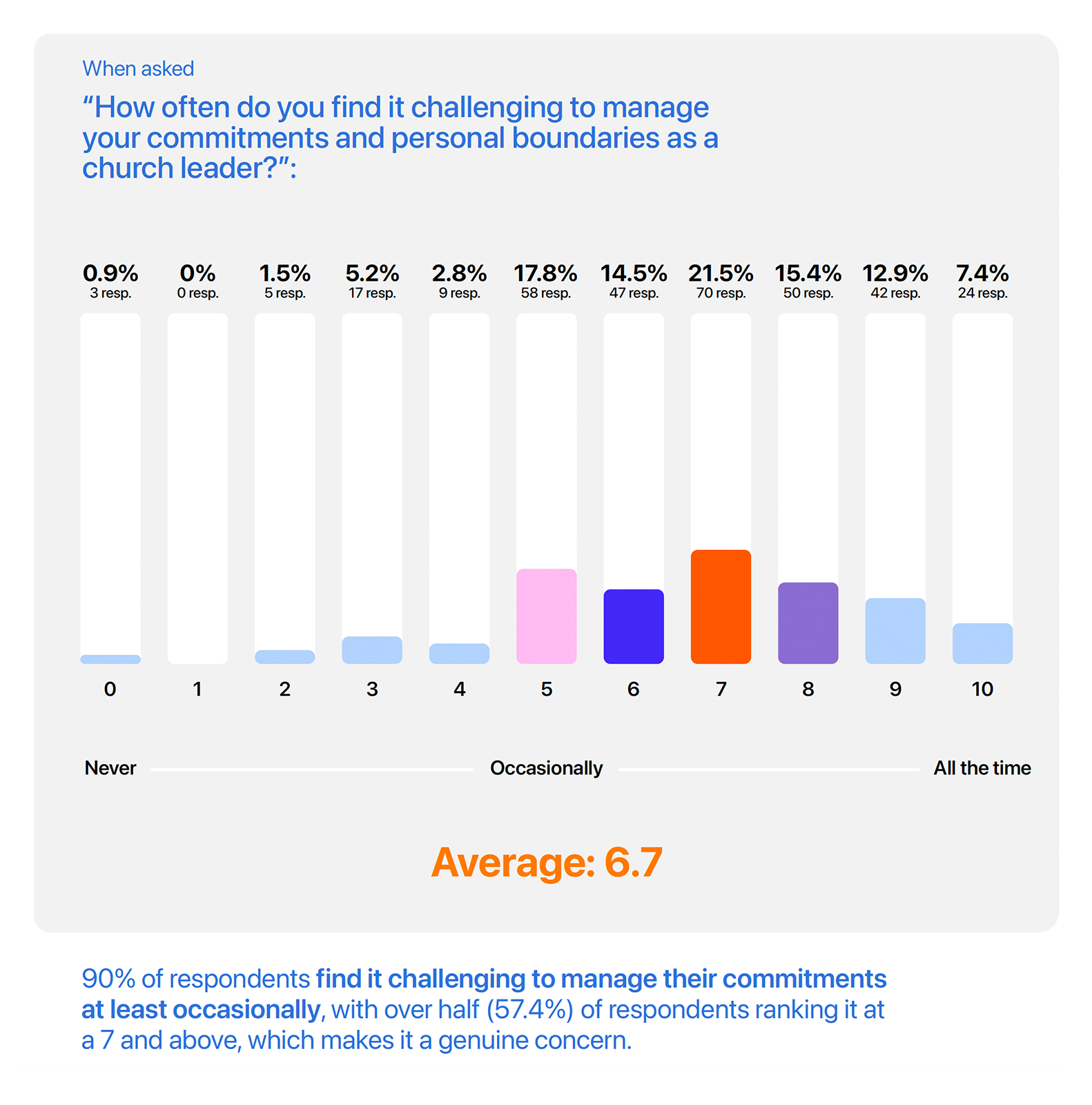
Claire also noted that when these youth leaders struggle, they tend to struggle alone.
Youth leadership can be very isolating because leaders are “staying behind” in the youth ministry while their peers move up to adult church and its activities.
“They not only lose their community and friends, they also miss out on the guidance and the leadership that they would have received if they had moved out into the adult church community,” she added.

Having led youths, I know how lonely it can be and how valuable support systems can be.
But I think a meaningful support system really, really has to add value. That’s a challenging line to discern and walk because once it starts “taking” from a leader, it can quickly become one more church thing to attend.
And let’s not forget, such support systems are likely run by other leaders too.
Insight #3: “Intentional & Effective Discipleship”
This Insight was collapsed with Insight #2 and presented together as their solutions overlapped.
The difficulties one faces in leading youths are clear to see from some of the sentiments shared in this Insight.
“Most Youth Leaders are young adults — but expectations and demands are placed on us without care for the demands we face in our own lives, for example, work, spouse, children. Instead, because we are doing well, we get loaded with more work. Itʼs very tiring,” said one youth leader (30-39).
Another youth leader (25-39) lamented: “The commitment level for Youth Leaders is especially high and there needs to be more love and understanding. Many past Youth Leaders have burnt out and just give up on serving God altogether — no one is addressing the issue. Just assuming that their presence in church is a sign of them being okay.”
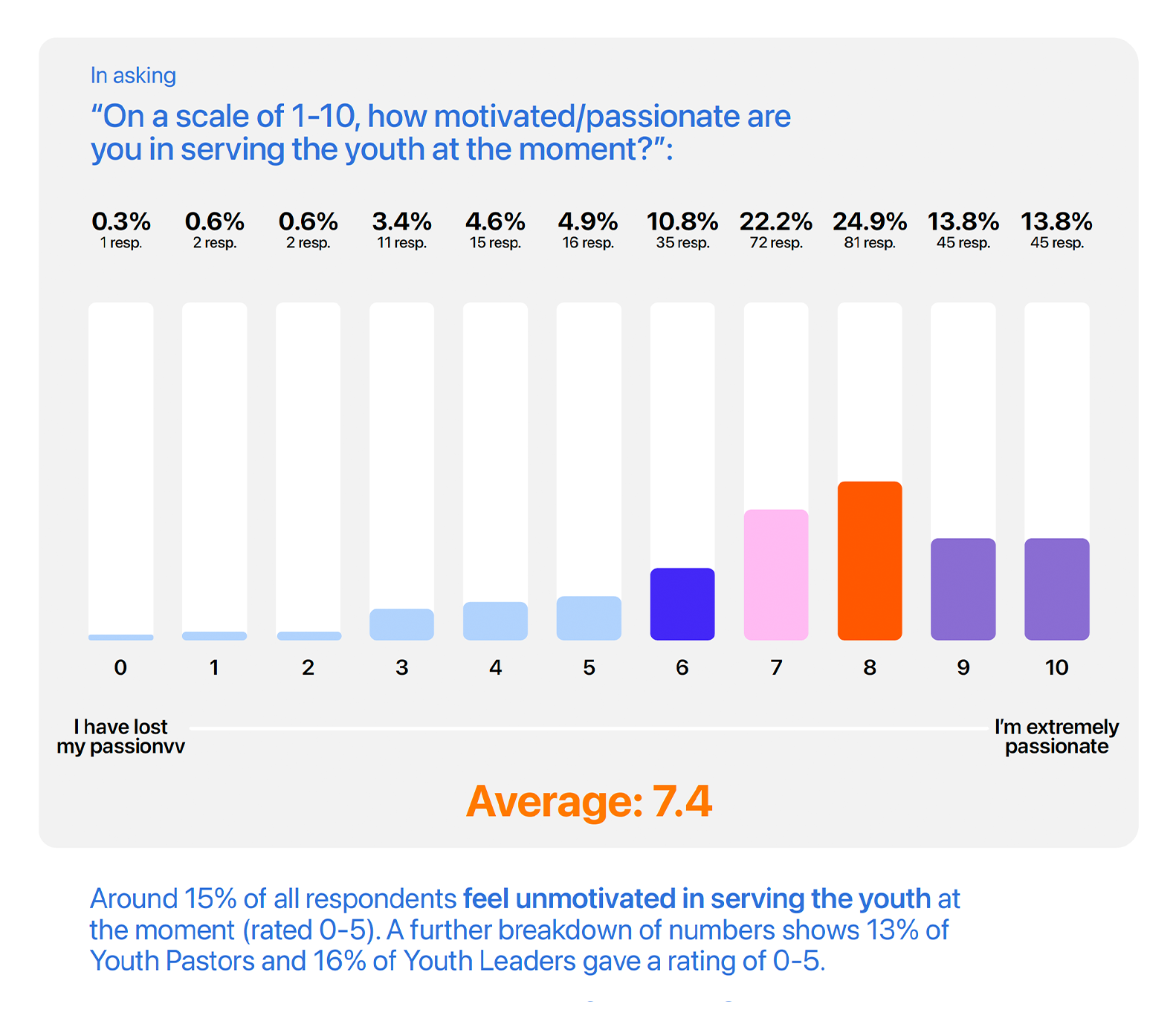
Having found that some 15% of all respondents currently feel unmotivated in serving the youth, the Insight also looked into the Key Factors responsible for this lack of motivation or passion towards youth ministry. They are:
- Discouragement due to lack of growth/fruit
- Busyness and exhaustion from balancing life and ministry; burning out
- Difficulty engaging the youth
- Issues with maintaining personal spiritual growth
I’ve been there. And I’d wager that anyone who has been involved in youth work would have experienced these Key Factors as well. Leaders should do what we can to be rested and fed, and youths – encouragement and reciprocation go a long way.
Besides that, the Insight concludes that more can be done to help youth leaders grow in their roles such as by providing sustained training or giving them spiritual mentors.
While those are good things, another actionable I would have loved to see on this Insight’s last page would be for the church to raise more young leaders up. Oftentimes, you simply need more hands for the work. I believe that would directly speak to the laments of overwork and burnout expressed by the youth leaders earlier on in this Insight.
Insight #4: “Navigating A Seismic Generational Shift”
The study’s findings indicate that communication and trust are needed to bridge generational gaps in church, especially when it comes to communicating with senior leadership.
One church leader’s lament served as the main idea of this Insight: “The needs of this new generation require us to completely re-think how we do things. I hope to be their advocate, but I often find myself stuck trying to convince stakeholders rather than spending time creating the change”.
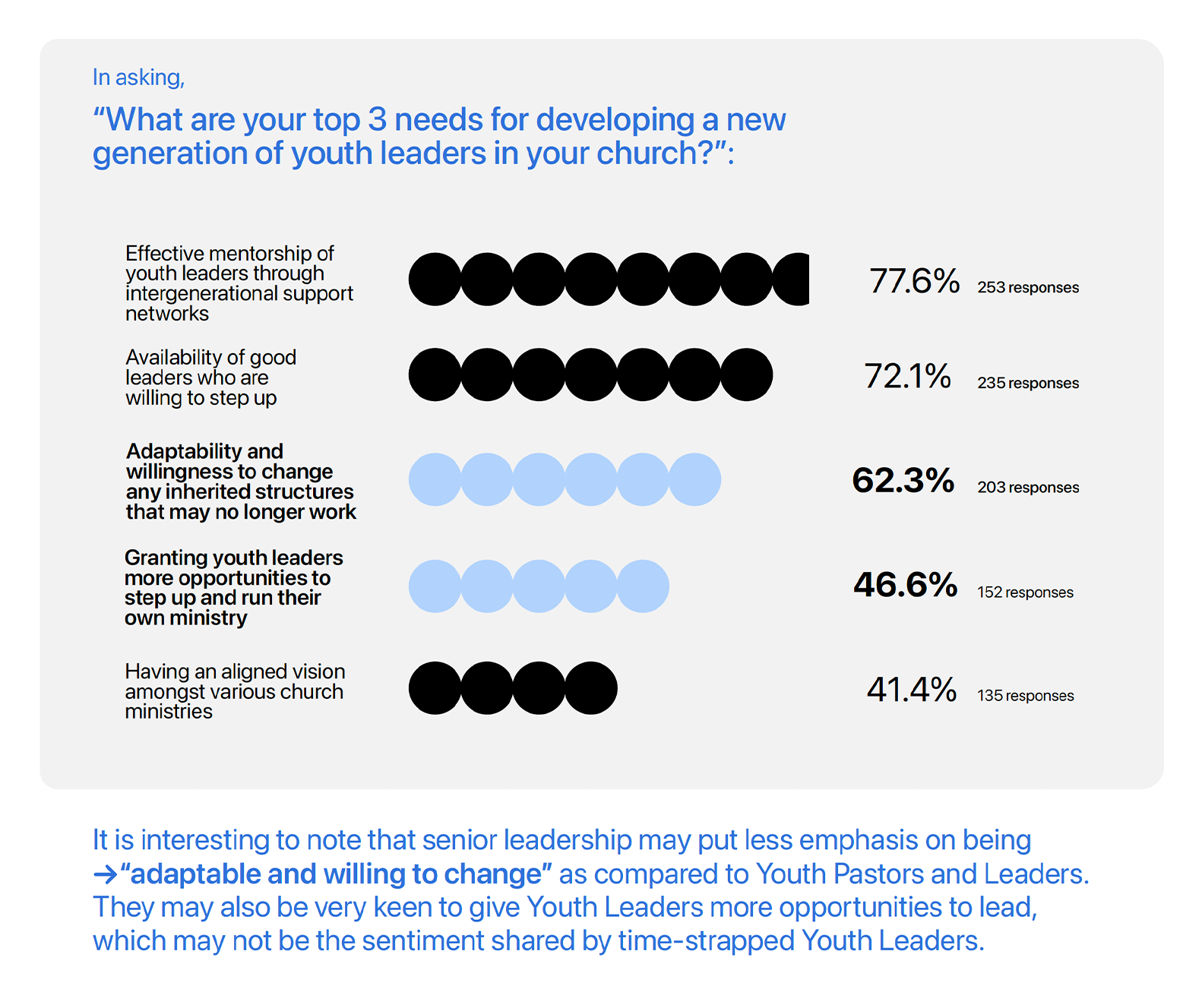
Jeanette Low of RiverLife Church began this segment with a quote from Rev. Tan Soo-Inn: “Churches are now experiencing up to five generations coexisting together.”
Such is the demographical landscape of the local church which requires leaders to create a safe space to navigate this “seismic generational shift”.
She added that it would be wise to be cautious about the narratives we hold about generations so as not to sideline or write off any generation. “Instead of us continuing narratives that aim to pit generation against generation, we need to be more mindful that we are actually on the same team,” she said.
Here, one of the closing reflections to this Insight in the study is especially apt: “Youth ministries must be wary of a narrative that pits the young against the old, or one that says the new is better than the old. Instead, a focus of stewarding the next generation together and doing what is timely and relevant would help align generations on the urgent task at hand”.
To that end, being mindful of the contexts each generation comes from is important, as is intentionally making the effort to connect across generations.
Affirming that every generation is precious in the Kingdom of God, Jeanette believes the two questions Christians should ask are these:
- What does it take for generations to journey together, believe in each other, and see each other flourishing and maturing in Christ?
- What does it take for the older generation to genuinely and sincerely empower the younger generations to rise up?
Insight #5: “A Safe Space For Youth Pastors/ Leaders To Experiment”
This Insight was collapsed with Insight #4 and presented together as their solutions overlapped.
The overall sentiment in this Insight shows that youth pastors and leaders desire the ability to try new ways of doing things, ways that may differ from what older members of the congregation might be used to.
One Methodist youth pastor (30-39) said: “I do wish that the older generation (Pastors, adult leaders and adults) in my church would recognise that times have changed, and the values and what the youth want/expect from the church is very different from their time.
“And that they would take the time to listen and understand more, not presume they know what’s best for the youth, and be willing to change/adapt/evolve where necessary. This includes the way we do church, leadership, community, preaching, and even down to small things like dressing.”
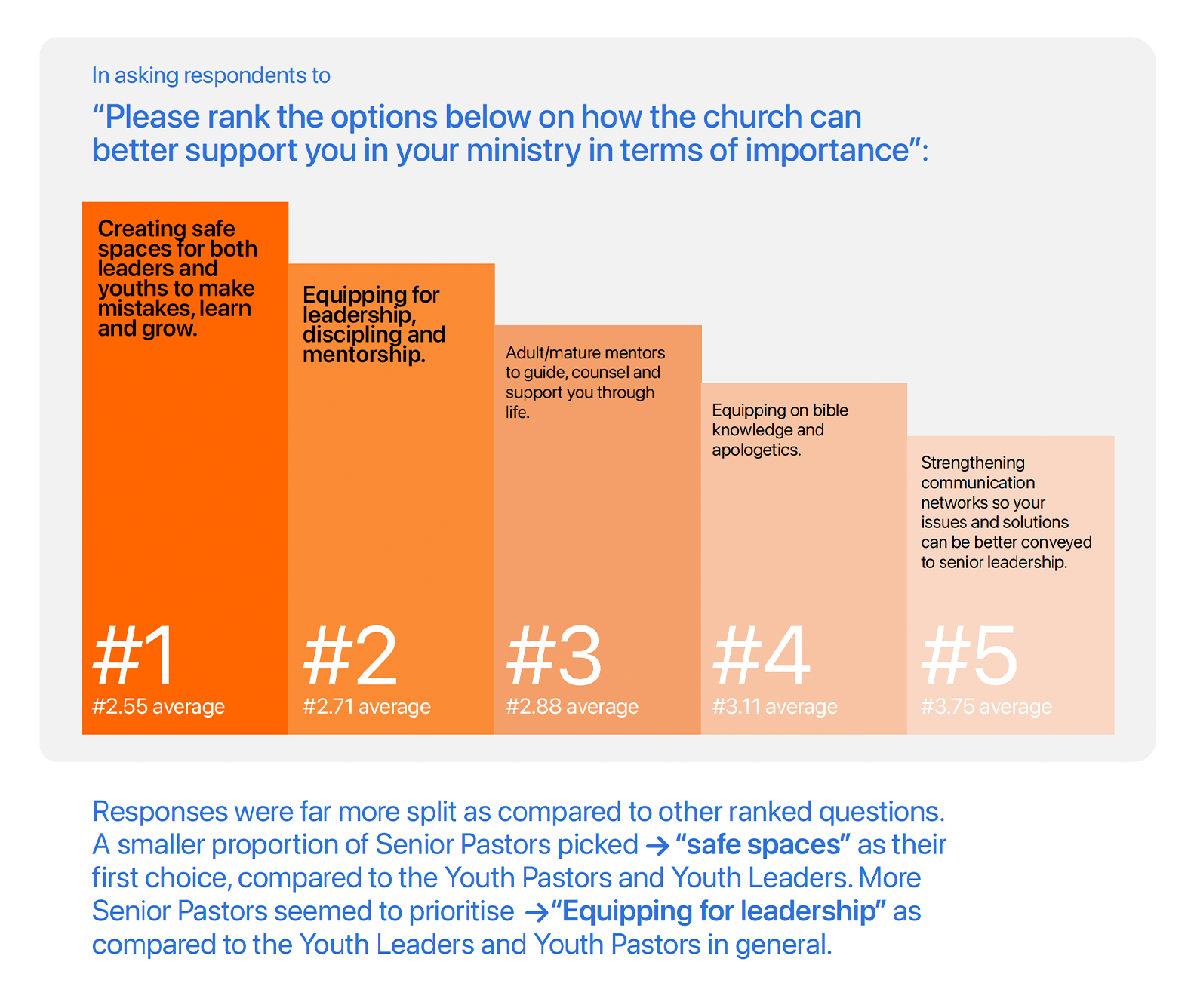
The Insight also shows that these youth leaders want a safe space where they can experiment and exercise their leadership gifts in (and where it’s also safe to fail!).
When asked, “Please rank the options below on how the church can better support you in your ministry in terms of importance”, the difference in the top responses between youth leaders and senior leadership was particularly telling.
“Creating safe spaces for both leaders and youths to make mistakes, learn and grow” was the top choice for Youth Pastors & Staff (31.7%) and Youth Leaders (30.8%).
The top choice for more than half of all Senior Pastor respondents, however, was “Equipping for leadership, discipling and mentorship” at 54.5%. Only 18.2% of Senior Pastors picked “Creating safe spaces for both leaders and youths to make mistakes, learn and grow” as their first choice.
So, there seems to be a mismatch. If creating safe spaces where mistakes can be made is not a priority for senior leadership, they may already be expecting the youth ministry to be a working and established product. Risk-taking, experimentation and evolution (traits that should be encouraged) can be very difficult in such a climate; we should be careful not to develop an unhealthy reliance upon familiar programmes and structures which may actually be becoming outdated, irrelevant or less effective.
Insight #6: “Building Spiritual Foundations for Youth”
When asked, “What do we need to do more to increase the success of the youth ministry in your church?”, the top three responses proved to be very similar across the Senior Pastors, Youth Pastors and Youth Leaders:
- Focus on discipling individual lives instead of revolving around programmes/events
- Taking time to build strong spiritual foundations in the youth
- Simple acts of care and love (e.g. sharing a meal and lending a listening ear)
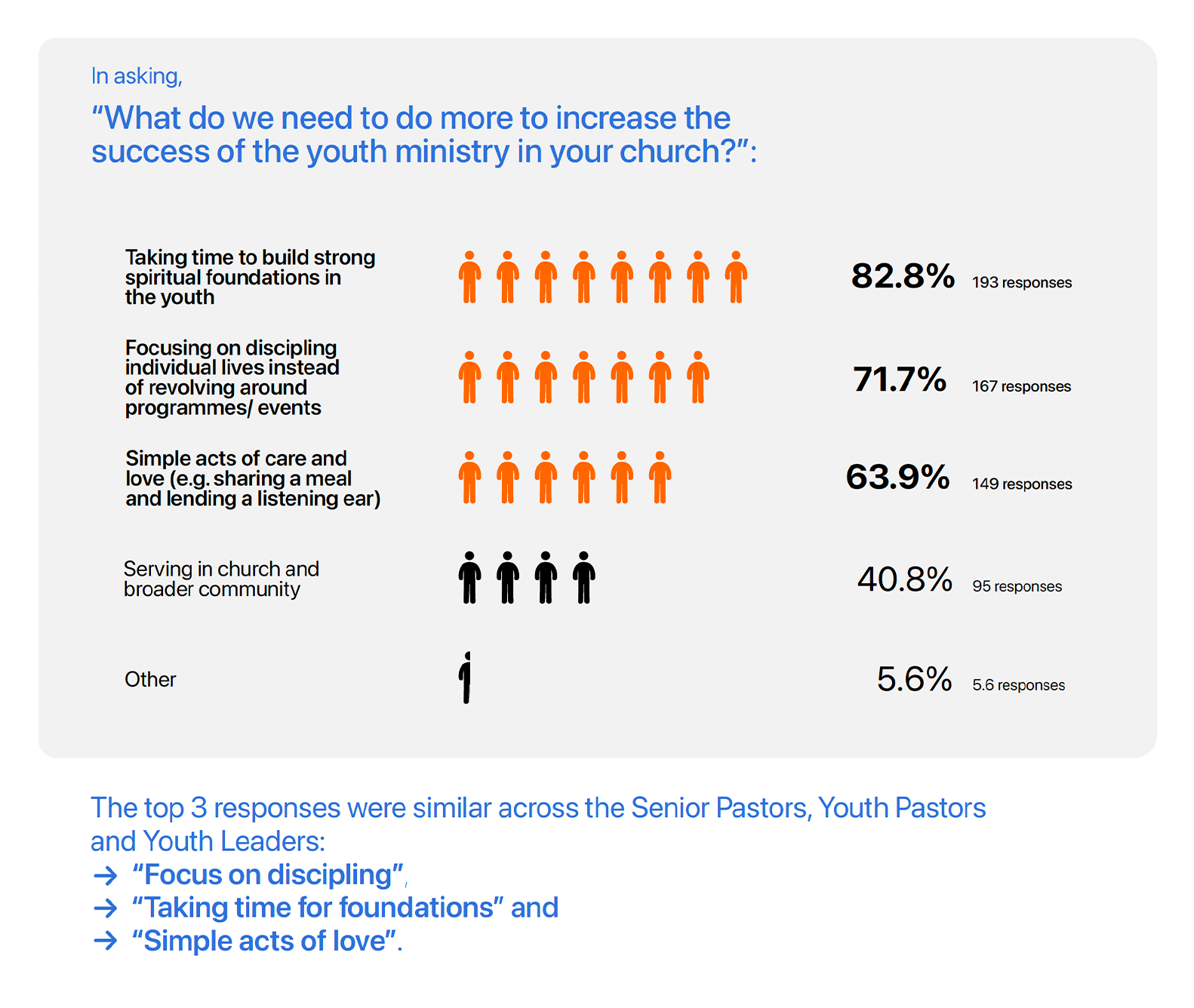
Taking a deeper look into these findings, Matthew Long (Cornerstone Community Church) shared that youths these days are more exposed, informed, well read and are probably asking the same tough questions their peers are asking.
“We need more effective and engaging methods of engaging with our youths,” he said, adding that leaders’ capacity to tackle these conversations is often lacking since many of these topics are “intricate” and “require certain level of expertise or experience”.
Additionally, leaders are often too time-strapped to engage meaningfully with ideas and topics that typically demand rigour and research.
I found myself agreeing with Matthew’s vision of having subject matter experts within churches for tough questions.
Tough questions are a core part of discipleship, and leaders who can provide robust answers with nuance and empathy to these questions would certainly do much in discipling the next generation.
Insight #7: “Partnering Parents As Trusted Allies”
Edwin Fung (New Life Community Church) then spoke on raising up the next generation and doing that as a collaborative effort with parents and the whole church.
He said the study revealed that youth leaders feel they are not well equipped to engage with parents: “They don’t know how to work with parents, they don’t know how to talk with parents, they don’t know how to update them or let them know how they can even be involved.”
And problematically, parents feel the same way; they neither know how to get involved nor to what capacity they should be serving.
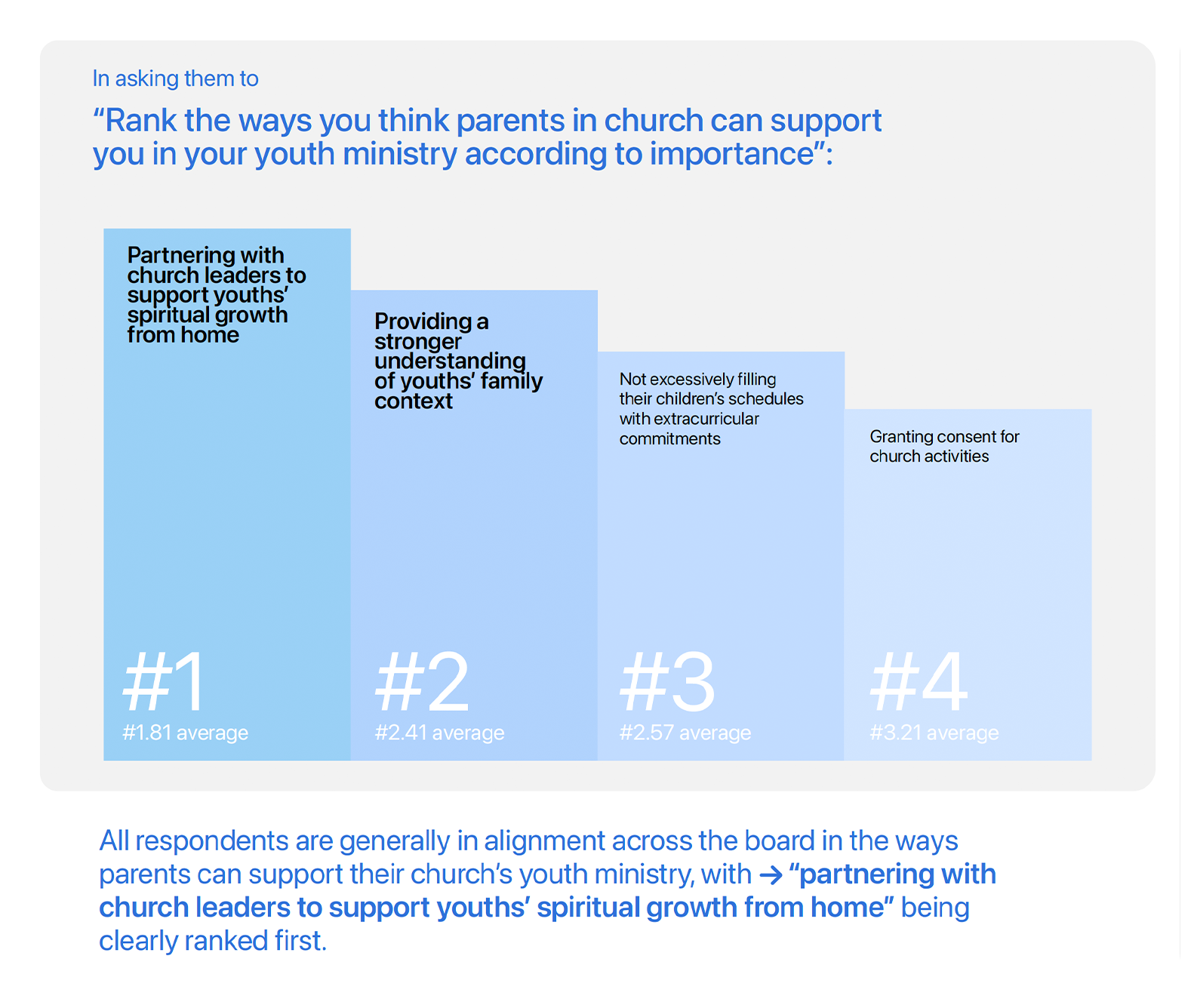
But consider this: in response to the question “Rank the ways you think parents in church can support you in your youth ministry according to importance”, the survey findings showed that “Partnering with church leaders to support youthsʼ spiritual growth from home” clearly ranked first, ahead of other options like “Providing a stronger understanding of youthsʼ family context” and “Not excessively filling their childrenʼs schedules with extracurricular commitments”.
When it comes to Christian families, I believe that parents must not see the youth ministry as a magical place where all the discipleship happens. Two hours in cell group or in service will never replace the hard work of discipleship in the home, where children daily learn and glean from their parents’ examples.
Finally, when Edwin talked about the need for “some sort of bridging structure that facilitates more frequent and effective engagement” between youths, their parents and the rest of the church – I agreed that such an initiative was relevant and needed.
However, given that the study itself acknowledges that “More families today are dual-income compared to 10-15 years ago, and as a result, many parents are less available due to work”, any such programme should recognise it will be challenged to position itself to families as something that is worth carving out time and energy for.
We must pray for the success of pastors and leaders who are preparing to push out such a thing!
Insight #8: “Spiritual Parenting As A Whole-of-Church Effort”
This Insight was collapsed with Insight #7 and presented together as their solutions overlapped.
While there is some overlap here with Insight #7, Insight #8 looks at discipleship from an inter-generational approach within the church.
The Main Idea reads: “An inter-generational approach to youth ministry can help fill in existing gaps in the area of spiritual parenting. Involving the whole village enables us to create a richer and more sustainable youth discipleship experience.”
Basically, the picture painted here is that there is a desire from youth leaders for older members of the congregation to come into young believers’ lives as spiritual mentors and guides.
Certainly, the study’s statistics seem to support this as much: nearly 40% chose “Spiritual guidance from experienced mentors” as the top choice when it came to what sort of involvement respondents desired from the rest of the church in their youth ministry.
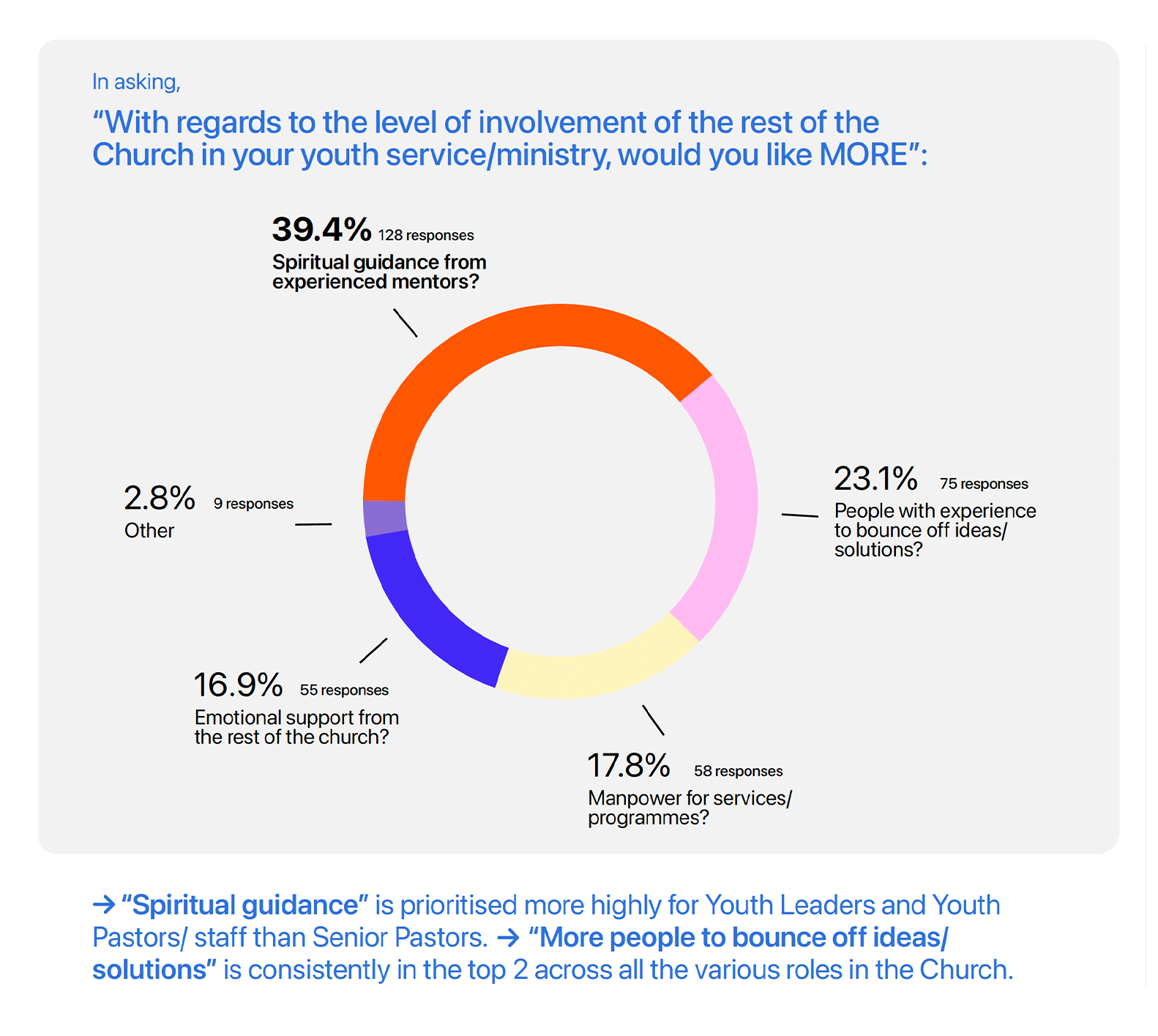
If we want to get more people in – older, mature and seasoned believers in and among the ranks of our young people – we need to create viable pathways for them to do so.
Just as they do in real life, good pathways enable and encourage access and also put limits in place. Mentors should be eased in, guided to guide, and know where to exit. Indeed, boundaries are something that the Insight’s conclusion delves into: “Clear definitions of the roles that adult mentors play in the youth ministry must be drawn up so that the previous generation does not overstep.”
The right kind of boundaries are so important. Considering that it is human nature to put up walls, older generations may need to step away from unhelpful mindsets and internalised segregations that keep them from ministering. What is ministry but the equipping, edification, encouragement and exhortation of people for the sake of Christ? Ministering and mentoring younger ones in the family of God are things that all generations can and should want to be a part of in some way or form. And to that end, subtle shifts in perspective can go a remarkably long way.
As 2 Timothy 2:2 reads, “And the things you have heard me say in the presence of many witnesses entrust to reliable people who will also be qualified to teach others.”, I resonate with the desire expressed in this Insight. May we be a people of quality who will preach the Word of God reliably to our youth, and may they teach others (and ourselves!) in turn.
Look out for our upcoming articles covering the FOPx Research 2023 study. We’ll be bringing you reflections from youth pastors who worked on the study, as well as articles from youth pastors on the ground responding to the study’s ideas and its suggested solutions.









